While guiding the destiny of overwhelmingly Muslim Jammu and Kashmir with India, Sheikh Mohammad Abdullah was confident that the state’s demographic character will not have any impact by India’s majoritarian politics, writes M J Aslam
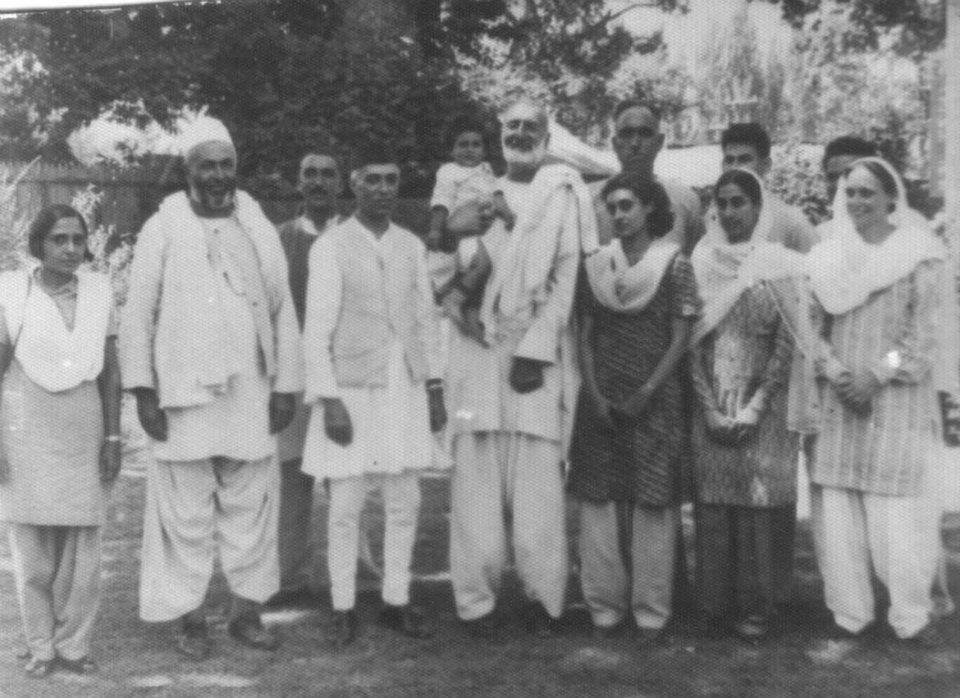
Srinagar 1945, A Power Portrait: (From R to L) Freda Freda Bedi, Mridula Sarabai, Indira Gandhi, Khan Abdul Gaffar Khan, Jawaharlal Nehru, and Abdul Samad Khan Achakzai. The woman on the left is not identified. Sheikh Abdullah is seen behind Indira and Bakhshi Ghulam Mohammad is behind Nehru. Khan Abdul Gaffar Khan is having one year old Rajiv Gandhi in his arms. Khan later spoke to NC’s Sopore convention. Picture: Andrew Whitehead Facebook
The unceremonious revocation of Jammu and Kashmir’s “special status” in the Union of India with simultaneous induction of the new regime of “domicile orders” has triggered serious concerns especially on what the “demography of Jammu and Kashmir is going to be, in the long run”? Under the grand scheme of things unfolding since August 5, 2019, such an “apprehension” can’t be discarded simplistically, as “unreasonable”?
Sheikh Mohammad Abdullah, the man who guided the destiny of overwhelmingly Muslim Jammu and Kashmir with India does not seem to have had any such apprehension, more than 70 years back. Reading and understanding the composition of the future democratic structure of Indian State in his own way, he seems to have missed identification of an inherent trait of every democracy, as John Stuart Mill has put it: “democracy”, is all about “tyranny by the majority”, [John Stuart Mill, On Liberty] or rule by the majority.
Sheikh apparently had lost sight of already-visible contours of the majoritarian character of future democracy that was emerging and going to progress with the passage of time. [Hindustan Times October 21, 2016, Hindu Republic: India is being recreated into a majoritarian State, also The Hindu, March 6, 2020, India has become strife-ridden majoritarian State Dr Manmohan Singh).
Instead, he believed and made people believe that Jammu and Kashmir being an absolute majority need not fear Hindu dominance in India.
Roots of Optimism
Let us first locate the threads of Sheikh’s thinking. It had its roots in the Kashmir politics of the late-1930s and 1940s that steadily but surely allowed itself to embrace the imported socialist or communist ideology. Many “prominent insiders” of his party had embraced communist ideology. [Andrew Whitehead, The People’s Militia: Communists and Kashmiri Nationalism in the 1940s]
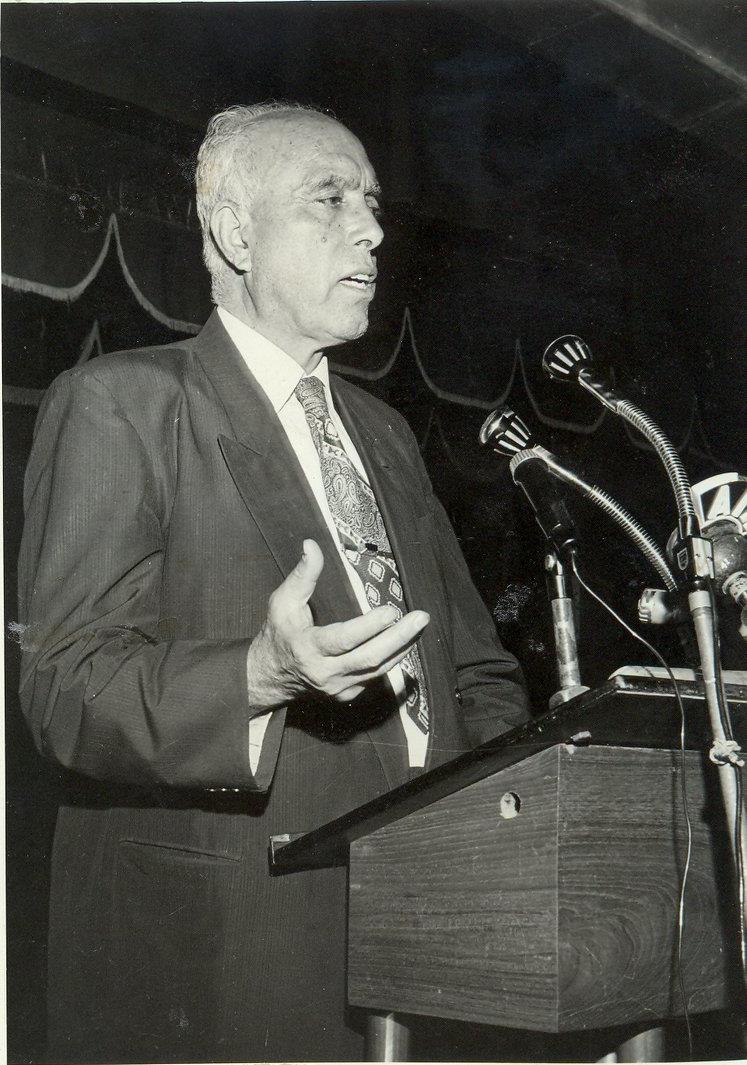
Making a speech: Sheikh Abdullah busy on stage
The principles of Marxian socialism that were sweeping across the borders after 1917 Bolshevik Revolution had found their recognition by the All India States Peoples’ Conference (AISPC), which was a “socialist” organisation of Indian Princes founded in 1920 in Bombay. Jawaharlal Nehru was its President from 1939-1946. Those years the bonhomie between Sheikh and Jawaharlal Nehru was in its peak and its influence was clearly penetrating deep inside Kashmir’s political horizon.
In 1939, when Nehru assumed charge of AISPC Presidency, Sheikh converted Muslim Conference to National Conference. The two events were contemporaneous. In 1946, at the behest of Nehru, who was still President of AISPC, Sheikh was elected AISPC’s Vice President. Sheikh succeeded Nehru as its President in 1946 and played a key role in bringing together the nationalist forces in the Princely States towards Indian Union. [Eminent Parliamentarians, Lok Sabha, 8:5]
In the words of an ex-bureaucrat, who worked closely with Sheikh Abdullah till his death in 1982, Nehru’s largess in appointing Sheikh Abdullah to the highest position in AISPC “bloated his (Sheikh’s) head which made him imperious in his dealings with his political opponents, ruthless, dictatorial and unforgiving.” [Ghulam Ahmad, My Years with Sheikh Abdullah]
Peshawar Meeting
Earlier, Indian National Congress had deputed its “liberal” leaders, Purshottam Das Tandon, in 1936, and then RKM Ashraf and Khan Abdul Gaffar Khan or Sarhadi Gandhi in 1937 to meet Sheikh in Srinagar, and arrange a meeting between him and Nehru in Peshawar where Nehru was scheduled to visit in 1938 at Khan’s invitation. RKM Ashraf during his stay in Srinagar in 1937 delivered several speeches on “progressive nationalism” of Indian National Congress for bringing Sheikh closer to its idea. [G H Khan, 346- 347]
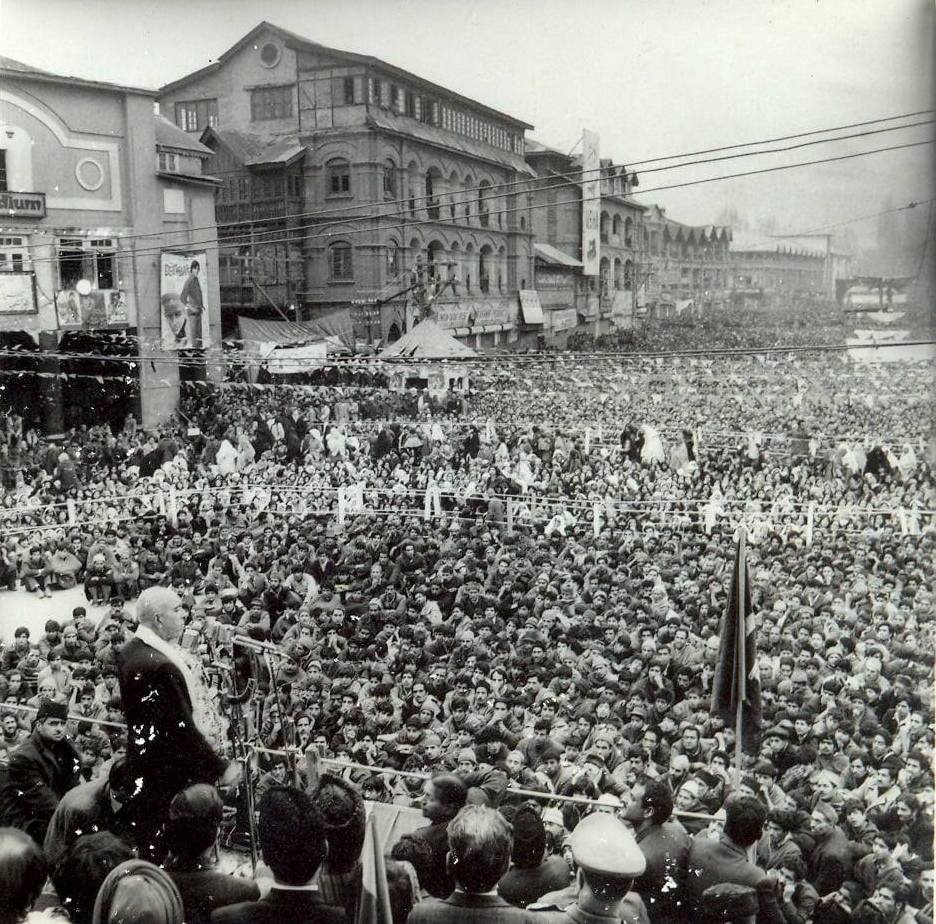
Sheikh Mohammad Abdullah speaking to people in Srinagar’s Lal Chowk. He was the most popular leader of Kashmir ever.
In 1938 Sheikh went to Peshawar where he met and developed intimate contact and relation with the “progressive” nationalist leaders of India – Nehru and Khan Abdul Gaffar Khan. Both Nehru and Sheikh exchanged ideas on national and state politics. Nehru suggested the opening of membership of the Muslim Conference to the Non-Muslims so that the campaign against the Maharaja could gain more strength. [F M Hassnain, 88]
The meeting bore sharp criticism from many Muslims leaders within and outside Kashmir. Molvi Mohammad Yusuf Shah described it as “political bargaining.” [Pir M Afzal Makhdoomi, the weekly Ainna, June 30, 1975; Gh Hasaan Khan, page 348] Interestingly, Sheikh has written forewords to both these books and has not disputed the claims of the two authors.
Andrew Whitehead writes that after meeting Nehru and Khan in Peshawar, Sheikh “began to develop a profile beyond Jammu and Kashmir …… swayed by Nehru, proposed renaming the Muslim Conference as the National Conference”, [Kashmir: History, Politics and Representation, Part One, Chapter Third] To note, all the three authors mentioned here are Abdullah sympathizers.
The Communists helped in shaping Sheikh’s radical campaign against the autocratic rule. In 1946, Rajani Palme Dutt, a prominent leader of the Communist Party of Great Britain, was invited by Sheikh to Kashmir. When he reached Srinagar in July 1946, Sheikh was behind bars for his “sedition speeches” during Quit Kashmir Movement. “Rajani Palme Dutt’s ringing endorsement of Sheikh Abdullah and his movement against autocracy in Kashmir both reflected and gave impetus to Indian communist activity in this out-of-the-way valley in the Himalayan foothills”. [Andrew Whitehead, The People’s Militia]
Differences With Abbas
It may be noted that the National Conference had become a formal member of AISPC way back in 1941. The apparently pro-Congress activities had greatly disappointed Choudhary Ghulam Abbas who then parted his ways with National Conference. Choudhary rejoined and rejuvenated Muslim Conference on June 13, 1941. Choudhary bore a lot of criticism for supporting Sheikh‘s conversion of the party to National Conference in 1939.
But in his autobiography, Kashmakash (Urdu), published in 1950, Choudhary has mentioned that before party-change was effected in 1939, there was “an agreement” between him and Sheikh that “Sheikh Abdullah will not own Congress politics nor will he support the Congress in any case…and that he shall never oppose in any manner whatsoever the Muslim League as being the only Muslim representative body of the Muslims of India…” [Kashmakash, Choudhary Ghulam Abbas, 178]
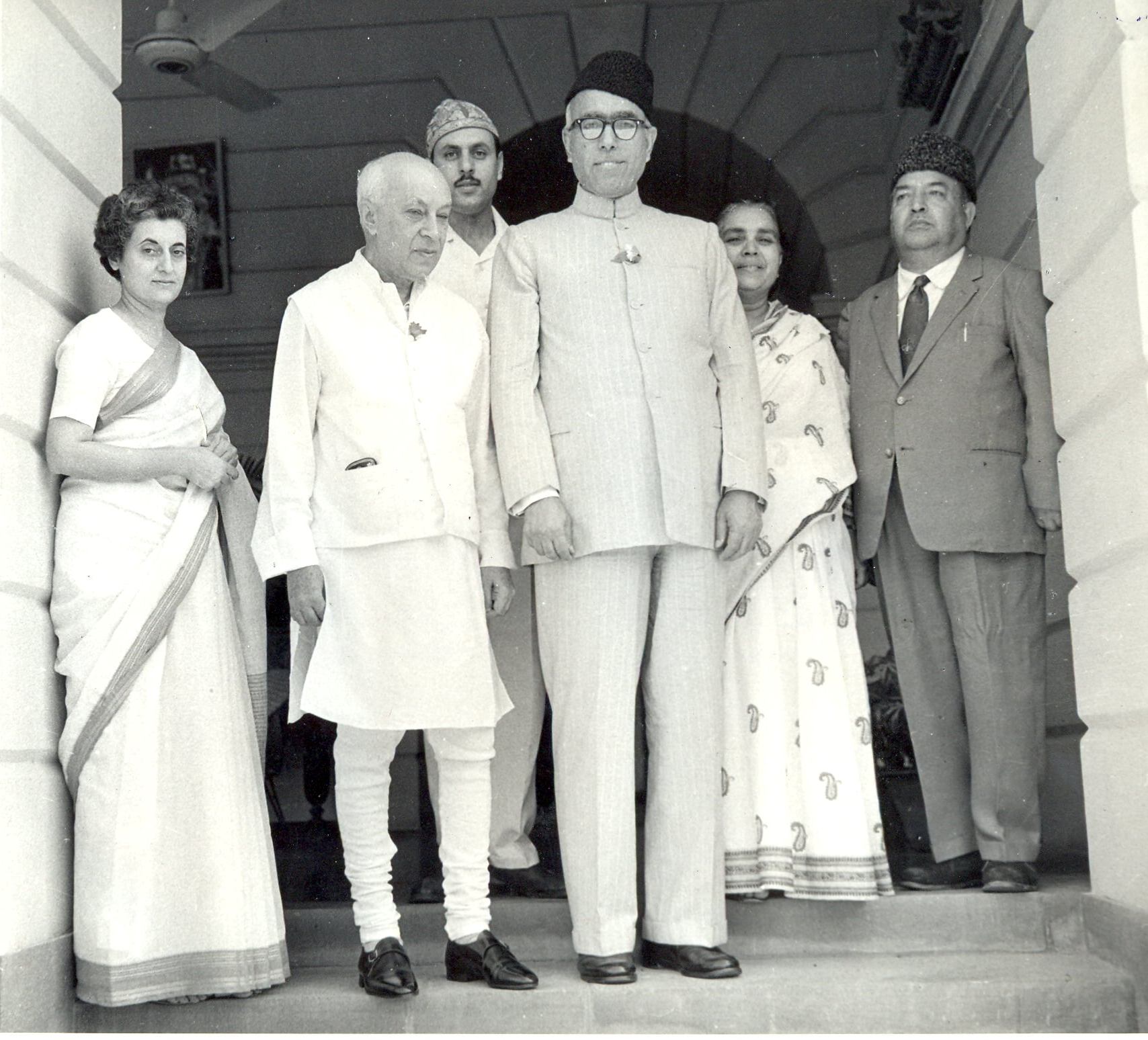
Sheikh Mohammad Abdullah with Pandi Nehru and Mrs Indira Gandhi. Mirza Afzal Beig and Dr Farooq Abdullah are also seen in the frame.
The contents of this agreement between Abbas and Sheikh are re-produced by P N Bazaz in his The History of Struggle…and Ghulam Hassan Khan in his PhD thesis first published in 1980 under the title of Kashmir Freedom Movement from 1931-1940. [Gh Hassan Khan; The Ranbir Weekly Jammu March 28, 1938 page 12]
AISPC which was politically linked to Congress ideology represented political movements in the Princely States. On April 24, 1948, after the independence of India, all units of AISPC formally merged with Indian National Congress. Its slogan of “responsible government” under the aegis of the ruler was also a famous slogan of Sheikh before and at the time of partition and “responsible government” was also the slogan of Congress which is proven by Resolution 60 of the Working Committee of the Congress adopted on July 29, 1935.
The Srinagar-based Urdu Newspaper, Hamdard, in its editorial by its editor, P N Bazaz wrote on June 10, 1947 as: “…NC is a tool in the hands of Indian National Congress Party that could be used against Indian Muslims and for the destruction of …….”.
Set Free
Sheikh Abdullah was released from Badami Bagh cantonment Srinagar on September 29, 1947. This is proven by the contents of the letter dated September 27, 1947, written by Nehru to Patel, reproduced in Selected Works of Jawaharlal Nehru (SWJLN) IV: 263-265 and Patel Correspondence, I: 45-47, 50-66, Item No 49.
Immediately, after his release, Dwarkanath Kachru, who was Secretary, AISPC and later private Secretary of Nehru, was deputed by Nehru to remain in close contact with National Conference leadership and stay at Srinagar for some days to keep Nehru informed about Sheikh’s release. Kachru was deputed by Nehru is clearly mentioned in SWJLN (Second Series, August 1947- December 1947, Vol 4) at several places, to “serve” Sheikh during those crucial months of 1947. He stayed in Srinagar for four days and wrote a letter on October 4, 1947, addressed to Nehru which was enclosed by Nehru with his letter dated October 5, 1947, addressed by him to Sardar Patel.
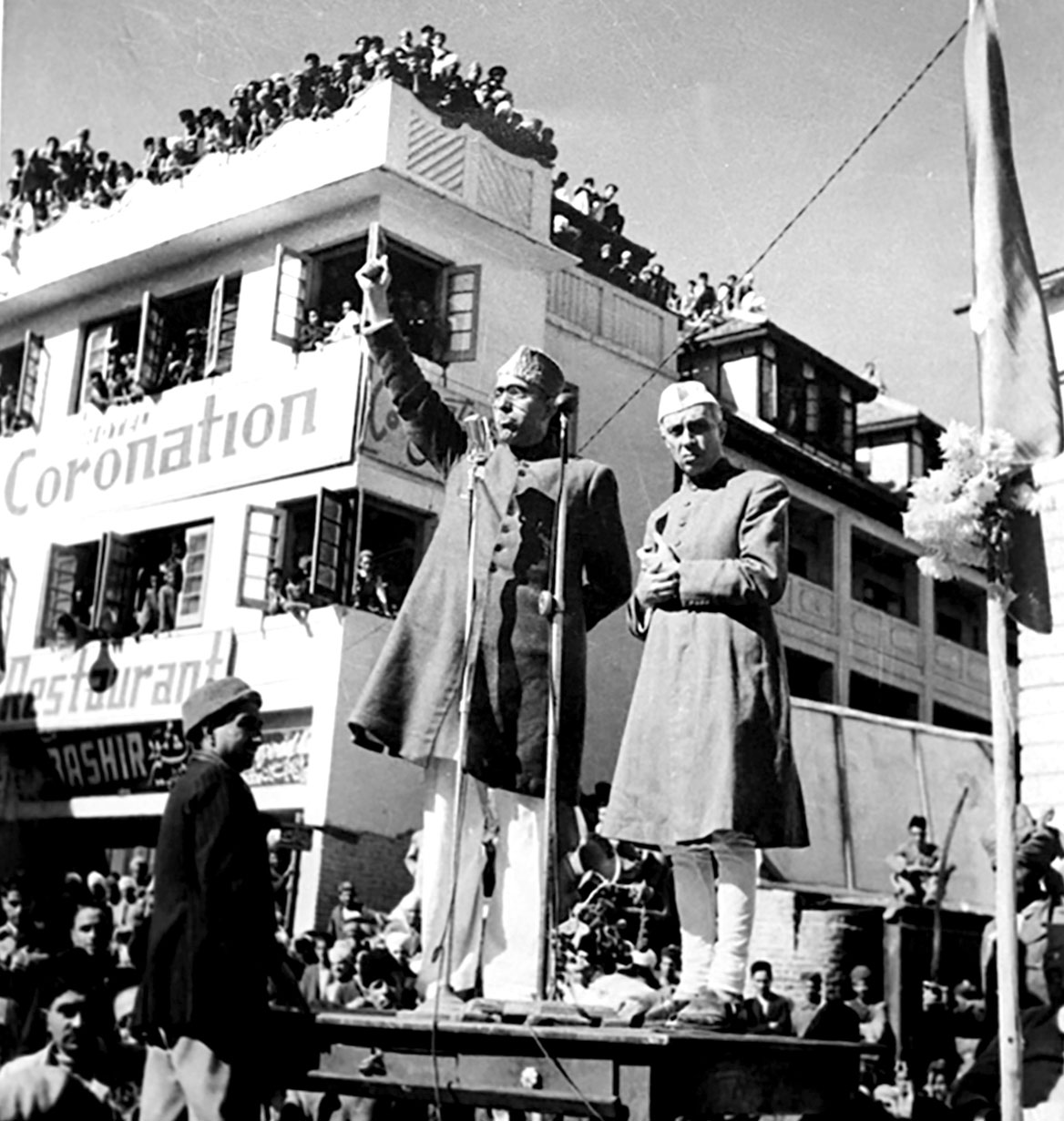
Sheikh Abdullah, Prime Minister of Jammu and Kashmir is making an announcement in a joint public meeting with Pandit Nehru: “This country is ours and we will decide its destiny”.
Kachru’s October 4, letter confirms many things. The relevant part of the letter is extracted here: “(1) Sheikh Sahib and his close associates have decided for Indian Union. (2) But this decision has not been announced yet and the impression is being given that so far the NC have taken no decision. …… (5) ….. Sheikh Sahib is delivering speeches to ……prepare the public for what seems to be the inevitable decision of the NC. (6)…… to show …issue of accession cannot be decided by religious sentiment and that the friends and sympathizers of Kashmiris during these years of struggle and suffering have been Gandhiji, Jawaharlal Ji and Congress, and not Muslim League and M A Jinnah…(latter) have done great harm to popular movement in Kashmir ….(their) objective is the preservation of princely order and feudal oppression. (7) ….objective of Kashmir NC is the attainment of people’s sovereignty with Maharaja enjoying a constitutional position ….”,
The letter is reproduced in Sardar Patel Correspondence, Volume One, pages 50, 54-58 and Satish Vashishth, Sheikh Abdullah: Then and Now, page 49; Christopher Sneden, Kashmir: The Unwritten History, page 67.
Conclusion
(A) It cannot be denied that democracy in a communally oriented society is mostly to take the ugly shape of majoritarianism anytime. So, not the rightwing parties like Jan Sangh, Hindu Mahasabha alone, the early Congress leaders themselves, soon after independence, spoke and advocated that India should adopt a single culture and single language and the minority must follow. The earliest dents to hallowed slogans of composite couture were made by “secular” leaders themselves. For fuller details see, P N Bazaz, op cit, The History of struggle]
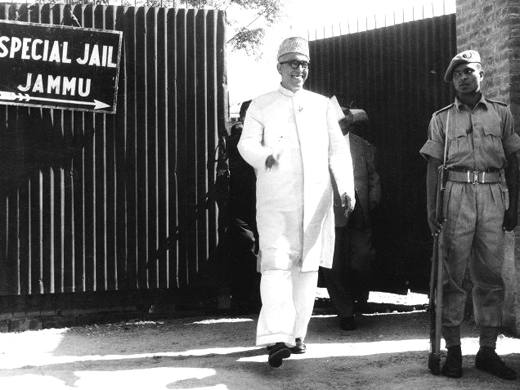
Sheikh Mohammad Abdullah coming out of the Jammu jail. Soon, he became the Chief Minister of Jammu and Kashmir.
(B) Why Sheikh was over-confident about the “secured-position” of Jammu and Kashmir Muslim-majority-character within Union of India? In 1946-1947 AISPC’ Princes Conference (Dec-Jan, 1946-47) at Udaipur, provinces of British India had expressed their apprehensions about the protection of their regional and cultural identities in future Indian Union. But, Sheikh dispelling their doubts stressed that they should “coordinate and merge the[ir]movements into a single channel” of Congress Movement. He said that such apprehension was born out of distress. He continued: “Take the instance of the cry of Pakistan. It was born of distress. Now it is stripped of all reasons. The question before the Muslims will be whether the realization of Pakistan is a blessing to them. I personally think that Pakistan will not help the Muslim masses but hinder them in their struggle for political and economic emancipation. In our State, this question, however, does not arise, because an overwhelming majority of the people are Muslims and there is no need to fear Hindu domination”. (Kashmir Legal Documents, editors, Mohan Krishen Teng, Ram Krishen Kaul Bhatt and Santosh Kaul, first published in 1977, as Kashmir Constitutional History and Documents, see Legal Document No 98)
(Author a is an academic and freelance columnist. Views are personal.)
from Kashmir Life https://ift.tt/3jAPcFK
via IFTTThttps://kashmirlife.net
No comments:
Post a Comment